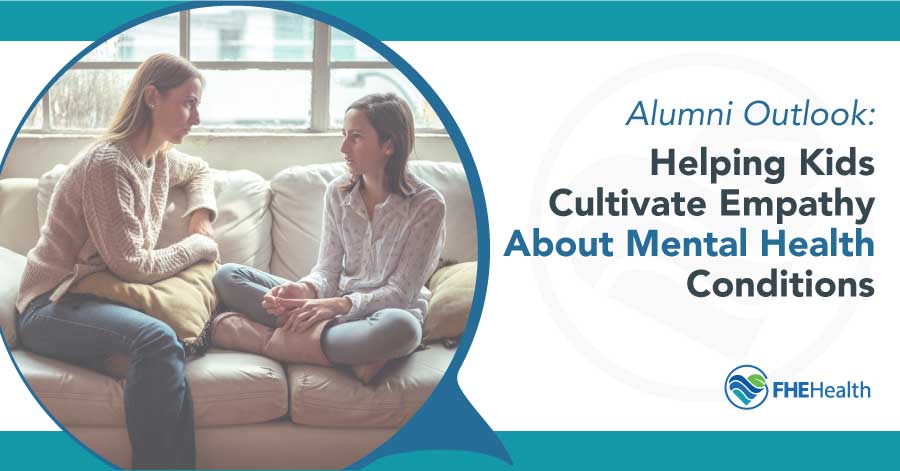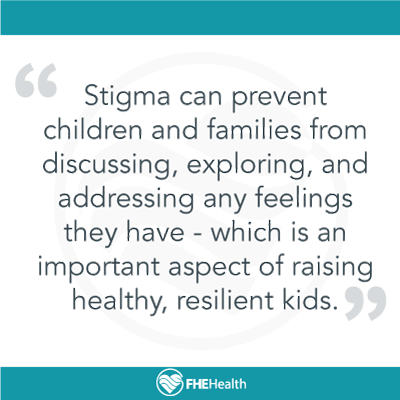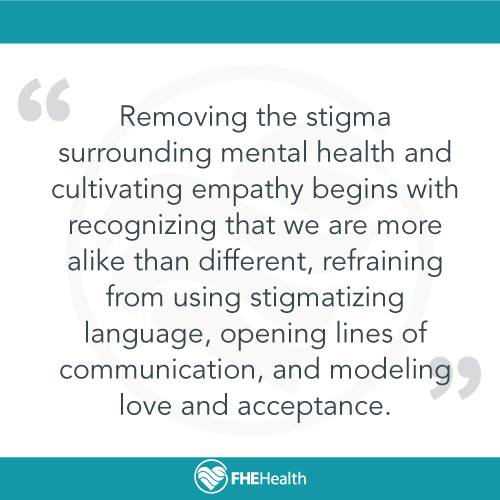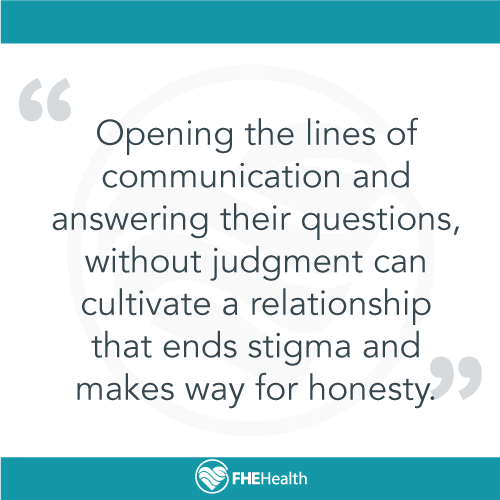
Cultivating empathy? This idea can be a complex situation if you believe empathy is an innate, fixed trait that some people are born with and others lack. However, empathy is not an all-or-nothing concept. In fact, it would be fair to say that empathy isn’t a trait that unfolds automatically in every situation. More specifically, cultivating empathy about mental health conditions in children is often attributed to a number of factors such as input from their environment, education, and open lines of communication.
In order to end the stigma and cultivate understanding and empathy regarding mental health conditions, it is important to talk to your children about mental health. If you are not educating them, then someone else will. More often than not, our children are exposed to mental health through media outlets or friends. Many of these depictions aren’t accurate or favorable. More often than not, movies and TV shows often portray individuals struggling with mental health disorders to be incompetent and even violent. These narrow-minded and inaccurate depictions often lead to misconceptions and stigmas.
Our children are little sponges. The majority of their opinions on certain topics – especially topics they are uneducated on – come from the opinions and education they receive during their earlier years. When parents open the lines of communication and remain transparent about any topic, children feel comfortable returning to that source they can trust to ask questions without feeling like they are being judged.
What are common stigmas children often hear surrounding mental health?
 Stigmas surrounding mental health often prevent individuals from seeking treatment. It is estimated that almost half of the children struggling with a mental health disorder to not receive the care and support they need due to stigma surrounding these disorders. Stigma can prevent children and families from discussing, exploring, and addressing any feelings they have – which is an important aspect of raising healthy, resilient kids.
Stigmas surrounding mental health often prevent individuals from seeking treatment. It is estimated that almost half of the children struggling with a mental health disorder to not receive the care and support they need due to stigma surrounding these disorders. Stigma can prevent children and families from discussing, exploring, and addressing any feelings they have – which is an important aspect of raising healthy, resilient kids.
Stigma is the notion – whether conscious or unconscious – that someone is different than you and the differences they have are negative. Stigma often separates “us” from “them”, especially in the eyes of children. Common public stigmas children are exposed to surround mental health include:
- People with mental health disorders are weak or lazy.
- This idea often occurs when a child has experienced similar issues and “never used a mental health disorder as an excuse to miss school, practice, chores, or other responsibilities.”
- People with mental health disorders are prone to violence.
- When children witness mental health disorders depicted in movies or on TV shows in extreme circumstances, they often develop the idea that these individuals are violent and uncontrollable.
- People with mental health disorders are scary and crazy.
- An example of this is when statements are made about tragedies or acts of violence such as school shootings on the media, such as “Only a crazy person would do something like this.” These simple words often cultivate hatred in regard to mental health disorders.
- People with mental health disorders are incompetent.
- When children hear parents making comments such as “My child suffers from depression or social anxiety and needs me to always be there for him/her.” Children often associate this with incompetence.
- People with mental health disorders are outcasts.
- The media often depicts individuals struggling with mental health disorders as outcasts, unwanted, and often rejected individuals.
How can families cultivate empathy surrounding mental health disorders?
 Families play a major role in helping end the stigma by talking about mental health in an open and healthy way. Removing the stigma surrounding mental health and cultivating empathy begins with recognizing that we are more alike than different, refraining from using stigmatizing language, opening lines of communication, and modeling love and acceptance.
Families play a major role in helping end the stigma by talking about mental health in an open and healthy way. Removing the stigma surrounding mental health and cultivating empathy begins with recognizing that we are more alike than different, refraining from using stigmatizing language, opening lines of communication, and modeling love and acceptance.
Here are a few ways you and your family can cultivate empathy surrounding mental health disorders.
1. Educate yourself and your children about mental health
The first and most important step in cultivating empathy surrounding mental health is to provide accurate information about mental health disorders. For example, educating yourself on the facts about disorders such as the symptoms of depression, anxiety, or bipolar disorder and then conveying this factual information in a way your child understands, can help cultivate a level of understanding rather than separation.
Using the correct terminology when discussing mental health disorders will separate the person from their diagnosis. For example, you will want to say an individual has a bipolar disorder rather than saying the person is bipolar.
It is also important that you frame mental health disorders as treatable conditions. Your child will feel more hopeful about seeking treatment and understanding that mental health is not a life sentence but rather treatable if you align your comments with this goal. Another important aspect of educating your child on mental health is discussing that the same way they see a doctor when they have an illness or injury, mental health is also a part of overall health and can be treated by a doctor as well.
2. Answer any questions your child has about mental health.
 Parenting is hard. Our kids are constantly asking questions about anything and everything. Sometimes this can be especially difficult when we feel like we don’t have the right answer to give them. The best way to combat the uncertainty surrounding potential questions on mental health is to educate ourselves.
Parenting is hard. Our kids are constantly asking questions about anything and everything. Sometimes this can be especially difficult when we feel like we don’t have the right answer to give them. The best way to combat the uncertainty surrounding potential questions on mental health is to educate ourselves.
Children are curious by nature. Opening the lines of communication and answering their questions, without judgment can cultivate a relationship that ends stigma and makes way for honesty. Allow your child to ask the hard questions and answer them with total honesty and compassion. These types of conversations will cultivate empathy surrounding mental health.
3. Be honest about medication for mental health disorders.
This may not be a popular opinion, but I believe the conversation surrounding medications for mental health disorders helps children identify the connection between mental health and overall health. Making the connection between the importance of treating mental health disorders with medication (if necessary) also helps to relinquish the stigma surrounding these disorders.
It is OK for your child to know that taking medication for a mental illness helps to treat the disorder. In the same way your child goes to the doctor and needs a shot to stay healthy or requires antibiotics when they get sick – mental illness can also be treated with medication.
4. Show compassion and encourage open conversations surrounding emotions.
Social stigmas often portray expressing emotions as a weakness. This ignorance can often spill into creating the stigma amongst children surrounding mental health. Talk to your child about how he/she is feeling. Remember to show empathy when they are upset or frustrated rather than telling them to “quit crying” without any further explanation.
The small step of taking the time to listen and support without judgment is the difference between cultivating empathy or encouraging the stigma. Remind your child that emotions are natural responses to things that are going on around them. Let your child know that if they feel overwhelmed about their emotions they can always come to you and you will listen and help them without judgment.
5. Share messages of hope and recovery
One of the most important aspects of cultivating empathy is to instill hope in your child’s perception of mental health. Messages of recovery are among the strongest tools in removing the stigma surrounding mental health. More often than not, we are encouraged by stories and people that we can relate to.
Children may not need to know all of the details surrounding the struggle of mental health disorders, but stories often relinquish negative perceptions. Sharing stories surrounding real people and their experiences with mental illness and how they are able to manage it and recovery often cultivates hope and empathy.






